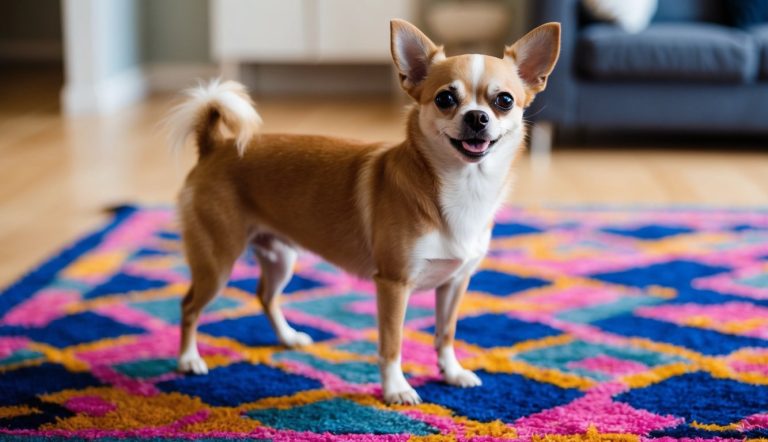A Chihuahua mixed with another dog breed creates unique combinations of physical and personality traits. These special mixes combine the tiny size and feisty spirit of Chihuahuas with characteristics from other breeds. Let’s explore these Chihuahua mixes.
If you’re still on the market to buy a Chihuahua mix, PuppySpot currently offers a $300 discount using the code PUPPY300, just click the banner below!
Popular Chihuahua Mixes
Small but mighty Chipins combine Chihuahua and Miniature Pinscher genes, creating smart dogs that weigh 5-15 pounds. The Pomchi (Pomeranian-Chihuahua) brings together two spirited breeds. These energetic companions make excellent apartment pets.
Common Chihuahua mixes include:
Genetic Traits and Variability
Chihuahua mix genetics create diverse combinations of physical features. Size can range from 5-15 pounds depending on the other parent breed.
Coat types vary widely:
- Short and smooth
- Long and fluffy
- Wire-haired
- Double-coated
Colors include black, white, brown, cream, and various patterns. Mixed breeds often inherit health advantages through genetic diversity. These mixes frequently keep the Chihuahua’s alert nature while gaining traits from the other parent breed. Their personalities tend to blend characteristics from both breeds.

Benefits of Choosing a Chihuahua Mix
Chihuahua mix breeds bring unique advantages by combining the lovable traits of Chihuahuas with desirable characteristics from other breeds. These special dogs offer flexibility in size, adaptable personalities, and potential health improvements through hybrid vigor.
Size and Space Considerations
- Most Chihuahua mixes stay small, typically between 8-12 inches tall and 5-15 pounds. This compact size makes them perfect for apartment living and small homes.
- They need less food than larger dogs, which means lower feeding costs. Their small size also makes them easy to transport in carriers or cars.
- These tiny dogs still need exercise, but they can get adequate physical activity even in limited spaces. A small yard or indoor play area can meet their exercise needs.
Temperament and Personality
- Chihuahua mixes often display enhanced friendliness compared to purebred Chihuahuas. The addition of other breeds can soften the sometimes-stubborn Chihuahua personality.
- Many of these mixes show high intelligence and respond well to training. They often maintain the loyal and loving nature Chihuahuas are known for.
- Different mixes suit different households. Some combinations create excellent family dogs, while others work better in adult-only homes.
Health and Lifespan
- Mixed breeds often benefit from hybrid vigor, which can reduce inherited health problems common in purebred Chihuahuas.
- Some mixes, like the Chipoo (Chihuahua-Poodle mix), may have hypoallergenic qualities from their non-Chihuahua parent.
- These dogs typically maintain the long lifespan characteristic of small breeds. Regular vet care and proper nutrition help ensure their health and longevity.
Caring for Your Chihuahua Mix
Proper care keeps these tiny pups healthy and happy through their 12-16 year lifespan. A mix of good nutrition, regular exercise, and consistent grooming forms the foundation of excellent care.
Nutritional Needs
Small breed dogs need specialized nutrition due to their fast metabolism and tiny stomachs. Feed adult Chihuahua mixes 1/4 to 1/2 cup of high-quality small breed dog food split into 2-3 meals daily.
Choose food with:
- 25-30% protein
- Healthy fats for coat health
- Added calcium for bone strength
- Small kibble size for easy chewing
Watch portion sizes carefully to prevent obesity. Fresh water should always be available in a shallow bowl that’s easy to access. Avoid table scraps and human food, as these tiny dogs can gain weight quickly. Treats should make up no more than 10% of daily calories.
Exercise and Mental Stimulation
These energetic little dogs need 20-30 minutes of exercise daily, broken into shorter sessions. Indoor play and short walks work well for their small size.
Safe exercise options include:
- Short walks (10-15 minutes)
- Fetch with tiny toys
- Indoor agility courses
- Puzzle toys for mental stimulation
Cold weather requires extra protection – a sweater or coat helps these small dogs stay warm during outdoor activities. Brain games prevent boredom and reduce unwanted behaviors. Rotate toys weekly to maintain interest.
Grooming and Hygiene
Chihuahua mixes need regular grooming regardless of coat type. Brush short-coated dogs weekly and long-coated dogs 2-3 times weekly to prevent matting.
Essential grooming tasks:
- Nail trimming every 4-6 weeks
- Weekly teeth brushing
- Regular ear cleaning
- Bath every 6-8 weeks
Check and clean facial folds daily if present. Use dog-specific shampoo and avoid getting water in ears during baths. Keep grooming sessions short and positive. Start handling paws, ears, and teeth early to build comfort with grooming.

Training and Socializing Your Tiny Companion
Proper training techniques make a huge difference in developing a well-behaved and confident Chihuahua mix. Starting early with consistent training methods and gentle socialization creates a balanced, happy pet that gets along well with people and other animals.
Positive Reinforcement Techniques
Small treats and praise work best for training Chihuahua mixes. Break treats into tiny pieces to avoid overfeeding these small dogs during training sessions. Keep training sessions brief – 5-10 minutes maximum. These tiny pups have short attention spans and tire quickly.
Key Commands to Master:
- Sit
- Stay
- Come
- Leave it
- Walk nicely on leash
Use a calm, upbeat voice and reward good behavior immediately. Never yell or punish, as this can make small dogs fearful and defensive.
Addressing Common Behavioral Issues
Chihuahua mixes can develop unwanted behaviors like excessive barking, nipping, or resource guarding without proper training. Address jumping up by turning away and only giving attention when all four paws are on the ground. This teaches polite greetings. Prevent separation anxiety by gradually getting your pup used to being alone. Start with brief absences and slowly increase duration.
Tips for Success:
- Stay consistent with rules
- Redirect unwanted chewing to appropriate toys
- Establish a regular routine
- Create a safe space like a crate or bed
Socialization Tips for Small Dogs
Early exposure helps prevent fearful or aggressive behaviors. Introduce your Chihuahua mix to new experiences between 3-16 weeks old when possible. Carry your pup in new environments until they show confidence. This provides security while they observe. Set up controlled meetings with calm, friendly dogs of similar size. Never force interactions.
Safe Socialization Activities:
- Gentle handling by different people
- Walking on various surfaces
- Exposure to household sounds
- Car rides
- Visiting pet-friendly stores
Always watch for signs of stress like trembling or hiding. Take breaks when needed and keep experiences positive.
Health Considerations in Chihuahua Mixes
Like their purebred parents, Chihuahua mixes can face specific health challenges that need attention and care. Taking proper precautions and knowing what to watch for helps ensure these tiny companions live long, healthy lives.
Regular Veterinary Care
- Chihuahua mixes need checkups every 6 months to catch potential issues early. These visits should include dental cleanings since dental problems are common in Chihuahuas.
- Small dogs often develop tartar buildup faster than larger breeds. Professional cleaning prevents tooth loss and infections.
- Weight monitoring is essential since these small dogs can quickly become overweight. A vet can provide proper nutrition guidance based on the specific mix breed’s needs.
Understanding Hereditary Health Issues
Genetic health concerns in Chihuahua mixes include:
- Patellar luxation (kneecap dislocation)
- Heart problems
- Hydrocephalus (fluid in brain)
- Tracheal collapse
The second parent breed can introduce additional health risks. For example, if mixed with a brachycephalic breed, breathing issues might occur. Regular screening for these conditions helps catch problems early when treatment is most effective.
Preventive Health Measures
Daily tooth brushing helps prevent dental disease. Use dog-specific toothpaste and a soft brush.
Keep vaccines current to protect against common diseases. Core vaccines include:
- Rabies
- Distemper
- Parvovirus
- Hepatitis
Maintain a healthy weight through proper portion control and regular exercise. These small dogs need only 20-30 minutes of activity daily. Use a harness instead of a collar to prevent throat injury and tracheal collapse.




